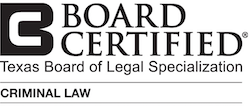Texas DWI Blood Tests
In most DWI arrests in the State of Texas, Breath Tests are used to measure the blood alcohol content (BAC) of drivers who are suspected of driving intoxicated while operating a motor vehicle. However, it is increasingly the case where investigating police officers are utilizing blood tests as the measuring tool when attempting to ascertain what a certain "BAC" level is at the time the vehicle was operated.
Moreover, many individuals consent to the taking of a breath test under the misconception that if they do not, the investigating police officers have the legal right to just obtain their blood whenever, and however, they want. This is NOT the case. Arresting police officers have to obtain a valid blood search warrant, and as a requirement, it has to stipulate to the exact reasons for what "Probable Cause" exists for the actual draw, and has to adhere to the strict standards for what a search warrant has to contain (including having been reviewed and signed by a magistrate or a judge with proper jurisdiction). Individuals have a constitutional right to be free of "unreasonable searches and seizures" - pursuant to the 4th amendment of the United States Constitution. Given all of this, it is imperative that you seek the knowledge and experience of an aggressive, skilled, and trained Texas DWI Attorney to assist with your case to help you mount the best possible defense.
DWI Blood Tests
In a perfect scenario, and if all procedures and protocol are followed, blood tests can be an accurate way when determining what a given "BAC" level is for an individual suspected of Driving While Intoxicated. Often, investigating officers utilize blood tests, as opposed to utilizing the Intoxilyzer 5000 for a breath test, to test for other illicit or intoxicating substances (other than through alcohol). Blood tests have become a larger part of DWI investigations over the past several years for a variety of reasons. However, this does not mean that every blood test is accurate. In fact, more procedures need to be followed in order to obtain an accurate sample of blood when later tested for the given Blood-Alcohol Content ("BAC"). However, if proper protocol is not followed, the integrity of any blood sample can be highly contaminated. It is vital to explore what procedures were followed, how and where the blood was drawn, in what manner and where, and many other variables that could result in a false-positive result.
After a driver has been arrested for a DWI charge, the "DIC" statutory warnings must be read to the driver. The "DIC-24" statutory warning must be read verbatim to the driver. A copy of this warning can be found on the DPS website: HERE. This warning basically informs the arrested individual what the "implied consent" laws are in the State of Texas, and also what penalties could result (regarding possible driving license suspension periods) if the citized accused is deemd to have "failed" or "refused" a blood sample. The driver must give his or her written consent in order for a blood test to be taken. If the citizen accused does not, unless it is an unusual situation, a blood search warrant must be obtained.
Law enforcement officials and police departments are increasing their ability, and more importantly - the frequency - with which blood samples are taken. It is important to note that if you refuse a breath test, they CANNOT just take your blood without your consent, unless a proper blood search warrant is obtained. It is for this reason why every citizen should be aware of their rights if placed in this situation. Even with the so-called "No-Refusal" weekends that many people hear about, and many police departments employ on certain weekends - it is important to understand that this is not something that is mandated by law with the Texas Legislature. In fact, blood search warrants still have to be obtained in the proper fashion. It usually indicates, in almost every case, just that the specific police department who publicizes a "No-Refusal" weekend is in effect, that if a person refuses to provide a specimen after the "DIC-24" warning is read - they will seek to obtain a blood search warrant from a magistrate or a judge. Usually in these situations, a magistrate will be at the jail to expedite the process of obtaining the blood search warrant. However, if this process is hastily done in an improper fashion, a knowledgeable and effective Texas DWI Defense Attorney can possibly attack it later in court.
Texas DWI Blood Search Warrants
Blood is drawn usually in a DWI investigation to be used later against the citizen accused as evidence of intoxication. It is important to note that a blood test may ONLY be taken without your consent, if the investigating police officer obtains a search warrant following your arrest for DWI and following your refusal after the proper "DIC-24" statutory warnings have been read. In order to obtain a DWI Blood Draw warrant, the officer has to swear in an affidavit, detailing and including all relevant facts related to the DWI arrest - and then present it to a magistrate who should review the content, and possibly sign the blood search warrant if it adheres to proper procedure and protocol for doing so.
Often, certain police departments have attorney’s (usually Assistant District Attorney's) readily available, to assist law enforcement officers when crafting these DWI blood draw search warrant affidavits to help convince the magistrate to issue and sign the warrant. However, just as is the case with any other search warrant, the DWI blood warrant should be based on the requisite amount of probable case. It is often the case when these warrants, or the process in general, was not followed, and therefore the warrant itself is defective, prima facie, on its face. Any search warrant, according to the United States Constitution, has to adhere to the "Four corners rule" (otherwise known as the exclusionary clause) - and a DWI blood search warrant is no exception. Considering this, it is advisable to seek the assistance of a skilled Texas DWI Attorney to review the instruments and procedures used in obtaining any blood search warrant to ensure it was taken in a valid manner.
Contact Now
In many circumstances, there very well may be doubt as to whether the officer actually was justified in obtaining a DWI blood search warrant. It is imperative that individuals are aware that law enforcement officials can be known to abuse the powers that is properly within their discretion when investigating a DWI arrest. Considering this, this exemplifies why it is extremely important if you, or a loved one, is charged with a DWI that you consult with an experienced and aggressive Texas DWI Defense Attorney who will explore all angles of your defense, including any blood search warrant obtained.
No matter what the charge is or what circumstances are involved - contact The Law Offices of Carl David Ceder for an initial consultation and free information related to DWI arrests in general - including what an individual should do if pulled over and feels they are under suspicion for Driving While Intoxicated, what to do following a DWI arrest, and what proper information is pertinent when analyzing any given DWI charge. Contact The Law Offices of Carl David Ceder now, and please visit www.AVVO.com (to read former client review sand peer endorsements from colleagues).
You can also reach The Law Offices of Carl David Ceder by calling 214.702.CARL(2275) or 469.2000.DWI(394). Simply put, if you are facing an arrest relating to a charge of Driving While Intoxicated, you need a skilled Texas DWI Defense Attorney to help assist and analyze your case. If you were arrested for a DWI, and you had a blood sample taken by law enforcement personnel that you believe will be used against you as evidence to help prove your intoxication level, you must remember and note that you do have options available to protect your rights and freedom. It is vital to mount a strong defense, regardless of the factual circumstances related to the DWI blood draw, and The Law Offices of Carl David Ceder has the resources, skill, and experience, to help analyze your case in the most effective way possible. You can contact The Law Offices of Carl David Ceder at anytime for assistance at 214.702.CARL(2275) or at 469.2000.DWI(394). Phones should be answered 24 hours a day/7 days a week for immediate and personal assistance.




















